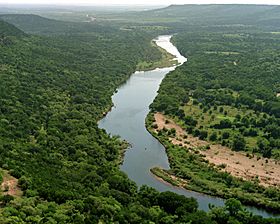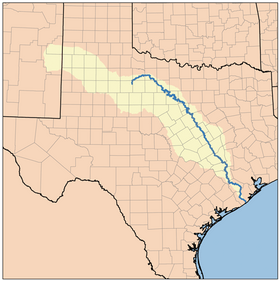Brazos River facts for kids
Quick facts for kids Brazos River |
|
|---|---|

Brazos River downstream of Possum Kingdom Lake, Palo Pinto County, Texas
|
|

Brazos River watershed
|
|
| Country | United States |
| State | Texas |
| Physical characteristics | |
| Main source | Llano Estacado |
| River mouth | Gulf of Mexico Brazoria County, Texas 0 m (0 ft) 28°52′33″N 95°22′42″W / 28.87583°N 95.37833°W |
| Length | 1,352 km (840 mi) |
| Basin features | |
| Basin size | 116,000 km2 (45,000 sq mi) |
The Brazos River is one of the longest rivers in the United States. It flows mostly through the state of Texas. Early Spanish explorers called it Río de los Brazos de Dios. This means "The River of the Arms of God."
The Brazos River is about 1,280 miles (2,060 km) long. This makes it the 11th-longest river in the country. It starts in New Mexico and flows all the way to the Gulf of Mexico. The area of land that drains into the Brazos River is huge. It covers about 45,000-square-mile (116,000 km2).
Contents
Where Does the Brazos River Start and End?
The Brazos River begins in Blackwater Draw. This area is in Curry County, New Mexico. It then flows southeast across Texas. The river ends where it meets the Gulf of Mexico. This is near Brazoria County, Texas.
Along its journey, the Brazos River passes through many different landscapes. It flows through dry plains and green farmlands. It also goes through busy cities.
Why Is the Brazos River Important?
The Brazos River is very important for Texas. It provides water for many things.
- Drinking Water: Many towns and cities get their drinking water from the Brazos.
- Farming: Farmers use the river's water to grow crops. This helps feed many people.
- Industry: Factories and businesses also use water from the river.
- Power: Some dams on the river help create electricity.
The river also offers fun activities. People enjoy fishing, boating, and swimming in its waters. Many parks are along its banks. These parks are great places for picnics and hiking.
What Is the History of the Brazos River?
Native American tribes lived along the Brazos River for thousands of years. They used the river for water, food, and travel. Later, Spanish explorers arrived in the 1500s. They gave the river its special name.
In the 1800s, the Brazos River was important for trade. Steamboats carried goods and people along the river. This helped Texas grow and develop. Many historic towns are located along the Brazos.
Different Parts of the Brazos River
The Brazos River has several main branches. These branches come together to form the main river.
- Double Mountain Fork: This branch starts in the Llano Estacado region.
- Salt Fork: This branch gets its name from salty areas it flows through.
- Clear Fork: This branch joins the main river further downstream.
These branches meet in Stonewall County, Texas. From there, the river flows as one large waterway.
Animals and Nature Along the River
The Brazos River is home to many different animals. Fish like catfish and bass live in its waters. Birds such as herons and egrets can be seen along the banks. Deer, raccoons, and other mammals also live near the river.
Protecting the river's environment is very important. This helps keep the water clean. It also protects the many plants and animals that depend on it.
Images for kids
-
An advertisement for the steamboat Yellow Stone, December 1836. Packet service between Quintana and Washington, Republic of Texas.
-
North Fork Double Mountain Fork Brazos River at the edge of the Llano Estacado
-
Double Mountain Fork Brazos River at the site of former Rath City, Texas
-
The Brazos in north Central Texas
-
The Brazos in southeast Central Texas west of Bryan, Texas
See also
 In Spanish: Río Brazos para niños
In Spanish: Río Brazos para niños
 | Precious Adams |
 | Lauren Anderson |
 | Janet Collins |








